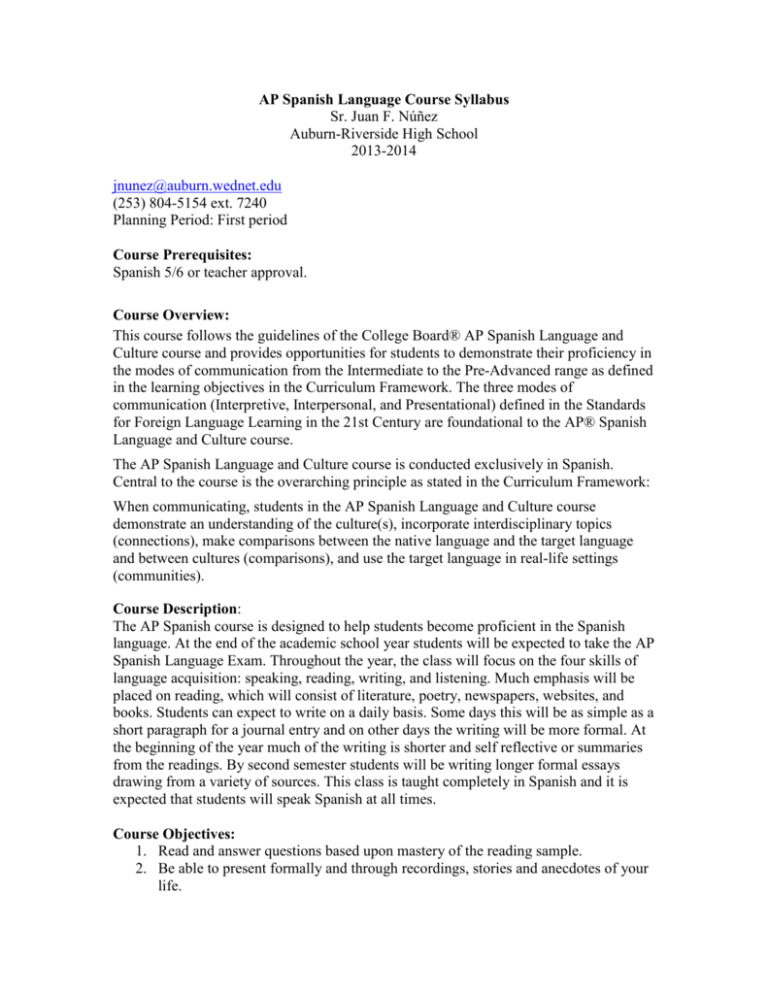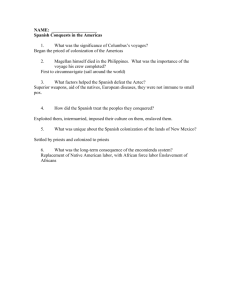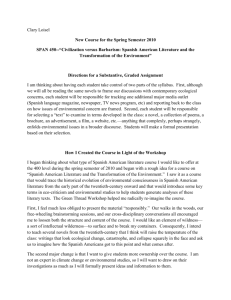
AP Spanish Language Course Syllabus
Sr. Juan F. Núñez
Auburn-Riverside High School
2013-2014
jnunez@auburn.wednet.edu
(253) 804-5154 ext. 7240
Planning Period: First period
Course Prerequisites:
Spanish 5/6 or teacher approval.
Course Overview:
This course follows the guidelines of the College Board® AP Spanish Language and
Culture course and provides opportunities for students to demonstrate their proficiency in
the modes of communication from the Intermediate to the Pre-Advanced range as defined
in the learning objectives in the Curriculum Framework. The three modes of
communication (Interpretive, Interpersonal, and Presentational) defined in the Standards
for Foreign Language Learning in the 21st Century are foundational to the AP® Spanish
Language and Culture course.
The AP Spanish Language and Culture course is conducted exclusively in Spanish.
Central to the course is the overarching principle as stated in the Curriculum Framework:
When communicating, students in the AP Spanish Language and Culture course
demonstrate an understanding of the culture(s), incorporate interdisciplinary topics
(connections), make comparisons between the native language and the target language
and between cultures (comparisons), and use the target language in real-life settings
(communities).
Course Description:
The AP Spanish course is designed to help students become proficient in the Spanish
language. At the end of the academic school year students will be expected to take the AP
Spanish Language Exam. Throughout the year, the class will focus on the four skills of
language acquisition: speaking, reading, writing, and listening. Much emphasis will be
placed on reading, which will consist of literature, poetry, newspapers, websites, and
books. Students can expect to write on a daily basis. Some days this will be as simple as a
short paragraph for a journal entry and on other days the writing will be more formal. At
the beginning of the year much of the writing is shorter and self reflective or summaries
from the readings. By second semester students will be writing longer formal essays
drawing from a variety of sources. This class is taught completely in Spanish and it is
expected that students will speak Spanish at all times.
Course Objectives:
1. Read and answer questions based upon mastery of the reading sample.
2. Be able to present formally and through recordings, stories and anecdotes of your
life.
3. Completion of assignments, tests, and free-writes.
4. Practice speaking daily in class, as well as mastering listening skills.
5. Develop consistent and positive attendance habits.
Evaluation:
Total of all possible points, nothing is weighted.
Scores:
A 93-100%
B+ 87-89.9%
C+ 77-79.9%
A- 90-92.9%
B 83-86.9
C 73-76.9%
B- 80-82.9%
C 70-72.9%
D+ 67-69.9%
D 60-66.9%
F 59.9% and below
Participation:
Participation is a large part of your grade. In order to truly acquire a language, one must
use it! It is my understanding that you are taking this course because you like Spanish and
want to learn to use it. In order to do that you must practice. You are learning a language
and I expect you to make mistakes. Come to class with a good attitude and willingness to
learn, participate in activities and work really, really hard. You will be speaking, reading,
writing, and completing a variety of listening activities. It is virtually impossible to make
these activities up on your own time. Please make every effort to attend class. You will
also be expected to read thirty minutes a week (a book of your choice) and watch the
Spanish channel thirty minutes a week outside of class.
Homework:
In addition to daily points there are also homework points that can be earned on the
completion of each assignment on the day that it is due! Homework is not busy work but
a reinforcement of what we are doing in class. Without this integral part of the learning
process neither of us knows what is making sense and what is not. Homework is meant to
be done on a daily basis. It will not be accepted late, except in the case of absence and
then you will have a number of days equal to that of the absence to complete the work. If
there is no formal assignment, please take time to read or watch TV in Spanish.
Assessments – Both formal and informal assessments on reading, speaking, listening and
writing will be performed on a daily basis, these will reflect the type of assessments you
will be doing on the AP Spanish exam. Every 2-3 weeks, a new theme is introduced;
however, interconnectedness of themes is expected and encouraged. Within the basis
theme, students work on all aspects of communication: Interpretive, Interpersonal, and
Presentational. In lieu of a test for each theme, students are evaluated based on various
assignments graded according to the AP World Language and Culture Scoring Guidelines
available in the AP Spanish Language and Culture Course and Exam Description.
Notebook Checks:
On account of the fact that we do not have a single textbook, it is imperative that you
have your Spanish notebook with you every day complete with all material given out in
class.
You are required to have a 1 ½ -2” three-ring binder with 5 dividers labeled:
1. Palabra del dia
2. Noticia de la semana
3. Apuntes
4. Practica de AP
5. Diario
There will be a notebook check at least once each quarter for a grade.
Behavior:
All school rules apply. Pay close attention to the electronics rules in your student
handbook. If you are texting in this class I will take your cell phone the first time I
see it. You can get it back at the end of the day. The second time I take it a parent
will have to come in to collect it and the third time it will be given to an
administrator. Talking, blurting and note passing are a hindrance to the learning
process, please join the conversation in Spanish and respect your classmates. Cheating
and plagiarism (including the use of language translators) will not be tolerated. If you
cheat expect to receive a zero for the said test, project or assignment.
National Standards:
This course will support the state and national learning standards of communication,
culture, connections, comparisons and communities.
Daily/Weekly/Monthly Activities to address Learning Objectives:
La palabra del día—students explore a word a day, analyze its meaning, find
root words, synonyms and antonyms, and make linguistic comparisons.
La noticia de la semana—once a week, students take turns giving a short
presentation about a relevant news story, summarize it for the class, and ask five
questions to create opportunities for open-ended discussion. Student will be assigned
news story on Monday and present on Friday.
El diario de las noticias—students keep a journal of the weekly news presented
in class with new vocabulary and reactions.
La discusión de la semana—at various times during the year, students are
responsible for posting a link to a news article, video, or podcast to the class blog, and
creating a discussion question for all in class to participate in an online discussion.
Everyone will have three days to respond or comment in the form of a short paragraph.
AP Wednesday--every Wednesday will be a day of AP practice exam samples.
All samples will be assessed using the AP scoring guidelines for this assignment.
Sometimes the teacher scores the work and other times the students and their classmates
score each other. This is an excellent way for students to internalize and understand the
scoring guidelines.
Writing--approximately every three weeks, a formal, well-organized,
synthesized, analytical or persuasive essay on an appropriate topic in reaction to a text or
information is written, discussed or viewed in class. The essay is evaluated for its
content, organization, cultural relevancy, range and appropriateness of vocabulary, and
grammatical accuracy.
• Writing journal entries, letters, e-mails, poems, abstract writing, creative writing, or
writing reactions to articles and lectures through an interactive social network and/ or
blog on topics/themes.
1st Semester:
Themes: Immigration, Mexico, traditional foods, poemas, el café and music.
Grammar: Gender of nouns, Stem changing verbs, Adjectives, Present, Preterit,
Imperfect, Commands, Pluperfect and Subjunctive Tenses, Por vs. Para, and Uses of the
preterit/imperfect tenses, Passive Voice and Idioms, gustar and similar verbs.
Readings: Stories from Albúm, Carta a Diós, Cajas de Cartón (Jimenez) Modernismo
(José Martí) “No oyes ladrar los perros” (Juan Rulfo) “Un Oso y un Amor” (Sabine R.
Ulibarrí) “El Rebelde” (Edwin Figueroa) “Quetzal no muere nunca” Selections from
Laura Esquivel’s books “Como agua para chocolate” y “ Malinche” “Los Zapaticos de
rosa” (José Martí) “La camisa de Margarita” (Ricardo Palma) “La Viuda de Montiel”,
“Un día de estos” Gabriel Garcia Márquez “Cartas de amor traicionado” (Isabel Allende)
Selected Poems (Pablo Neruda) “El Tunel” (Ernesto Sábato) “Los dos reyes y los dos
laberintos” Readings from the web, newspapers, and local legends/myths from the
geographical area of study.
Writing: Free-writes, Quién soy yo?, Journals, as well as answering questions from
readings, in-class writes, summaries of readings both from home reading and in class
stories. Compare/contrast essays and analyses of readings and films.
Speaking: Mi vida, dialogues and skits, Whose Line Is It Anyway, Bolsa de Sorpresas,
as well as answering questions from readings.
Oral Presentations on immigration, show and tell, memorized poem, and coffee trade
show representing the county of your choice.
Listening: Listening activities from Abriendo Paso and Conexiones, Noticiero
Univision, Despierta America, Spanish movies including “La Misma Luna” (PG-13),
and “El Norte” and BBC Mundo http://news.bbc.co.uk/hi/spanish/news, Radio nuevos
horizontes http://www.nuevoshorizontes.org, Langmedia
http://langmedia.fivecolleges.edu/collection/lm_spanish.html, Uteach proficiency
exercises http://www.laits.utexas.edu/spe/siteindex.php, Radio Naciones Unidas
http://radio.un.org/es/
2nd Semester
Themes: España, Argentina, Derechos Humanos, Estereotipos, La familia, Exam Prep
Grammar: Passive Voice, Future, Conditional, Relative Pronouns, Sequence of tenses,
Present Perfect Subjunctive, Pluperfect Subjunctive, practice exam activities
Reading: “La Conciencia” “El Arbol de Oro” (Ana Matute) “Los indios kunas” (César
A. Yunsán) Selection from “El hablador” (Mario Vargas Llosa) Poemas: “Canción del
jinete” y “Arbolé, arbolé” ( Federico García Lorca) “Pastoral” (Gregorio Martínez Sierra)
“Día de las madres” (Daisy Zamora) “Emma Zunz” (Jorge Luis Borges) Readings from
the web, newspapers, and local legends/myths from the geographical area of study,
practice exam activities
Writing: Free-writes, Quién soy yo?, Journals, as well as answering questions from
readings, in-class writes, practice exam writing activities with integrated skills, essays
discussing cultural themes and using prompts from AP* Spanish Preparing for the
Language Examination.
Speaking: 10 minute presentations, practice exam activities, both informal and formal
speaking
Listening: Listening activities from Abriendo Paso, Conexiones, AP* Spanish Preparing
for the Language Examination, Noticiero Univision, Despierta America, and selected
movies in Spanish including “El Espejo Enterrado: Reflexiones sobre España y el Nuevo
Mundo”, “Tortilla Soup,” (PG-13) “Romero,” (PG-13) “El Tiempo de las Mariposas,”
(Pg) “Real Women Have Curves,” (Pg-13) “Goal”(PG) and “Shrek 1 and 2”(PG) “La
Historia Oficial” (PG-13) and BBC Mundo http://news.bbc.co.uk/hi/spanish/news, Radio
nuevos horizontes http://www.nuevoshorizontes.org, Langmedia
http://langmedia.fivecolleges.edu/collection/lm_spanish.html, Uteach proficiency
exercises http://www.laits.utexas.edu/spe/siteindex.php, Radio Naciones Unidas
http://radio.un.org/es/
***Keep this syllabus in your notebook throughout the entire year.
Bibliografía
Diaz, José M., Leicher-Prieto, Margaarita, Nissenberg, Gilda. AP* Spanish Preparing for
the Language Examination. Pearson Prentice Hall, Boston, Massachusetts. 2007.
Bajo la Misma Luna, dvd. Patricia Riggen, (Director). PG-13. 2007.
Barlow, Genevieve, Leyendas Latinoamericanas, NTC, 1997. 2nd E d.
Chastain, Kenneth. Exploraciones en literatura. National Textbook Company,
Lincolnwood, Illinois. 1994.
Díaz, José M., Nadel, María F., Collins, Stephen J., Abriendo Paso: Gramática. Pearson
Prentice Hall, Upper Saddle River, New Jersey. 2005.
Díaz, José M., Nadel, María F., Collins, Stephen J., Abriendo Paso: Lectura. Pearson
Prentice Hall, Upper Saddle River, New Jersey. 2007.
El Espejo Enterrado: Reflexiones sobre España y el Nuevo Mundo, La Virgen y el Toro.
Caros Fuentes (Writer and Presenter) Public Media Video 1991.
El Hombre de la Esquina Rosada, Jorge Luis Borges (writer). Films for the Humanities
and Sciences. 1996.
González, J.R Literatura moderna hispánica. National Textbook Company,
Lincolnwood, Illinois. 1975.
In the Time of the Butterflies, dvd. Marian Barroso, (Director). 2001.
La Historia Oficial, video. Luis Puenzo, (Director). 1985.
Kanter, Abby, Encuentros Maravillosos: Gramática a través de la literatura. Prentice Hall,
Upper Saddle River, New Jersey. 2005.
Kátan-Ibarra, Juan. Perspectivas culturales de Hispanoamérica. 2nd ed. Nacional
Textbook Company, Lincolnwood, Illinois. 1995.
Real Women Have Curves, dvd. Patricia Cadoso (Director). Pg-13. 2002.
Romero, dvd. John Duigan (Director). PG-13. 1989.
Tortilla Soup, dvd. María Ripoll (Director). Pg-13. 2001.
Treacy, Mary Jane, Nancy Abraham Hall. Campo abierto. Houghton Mifflin Company,
Boston, Massachusets. 1984.
Ulloa, Justo. Graded Spanish Reader, 3rd ed. D.C Heath and Company,
La Jolla, CA. 1987.
Valette, Rebecca M., Joy Renjilian~Burgy, Album. D.C. Heath and Company, La Jolla,
CA. 1984.
Zayas-Bazán, Eduardo, Susan M. Bacon, Dulce M. García, Conexiones: Comunicación y
Cultura. Prentice Hall, Upper Saddle River, New Jersey. 2005. 2nd Ed.
Teachers note: This is a college level course and I expect that you are going to treat it
that way. I have spent and will spend a great amount of time and effort preparing for this
class. It is therefore expected that you will do the same. If you do not have a sincere
desire to learn Spanish, please save yourself and others by re-thinking your choice of
classes. Off-task behavior is not tolerated in this class. We will learn a great deal of
Spanish and should have fun along the way.
Student Signature:_______________________________________________________
Parent Signature:________________________________________________________
Video Viewing Permission
In order for a student to watch videos in this class, I must have a parent/guardian’s
signature on file. Most videos are documentaries or travel-related, but there are
occasional videos/movies used that are rated PG or PG-13. If you do not want your
student to watch a video, please indicate so by signing in the “no” box below. Your
student will be given an alternative assignment to be completed in the library. Please
contact me with any questions or concerns with regards to specific movies. Thank you!
YES, I _________________________________________(parent/guardian)
DO
grant permission for ________________________________________(son/daughter)
to watch the above-mentioned videos in Spanish class.
Parent/Guardian Signature:_____________________________________________
Date:_________
____
NO
, I ____________________________________________(parent/guardian)
DO NOT grant permission for __________________________________(son/daughter)
to watch the above-mentioned videos in Spanish class.
Parent/Guardian Signature:_________________________________________________
Date:_________
_____









